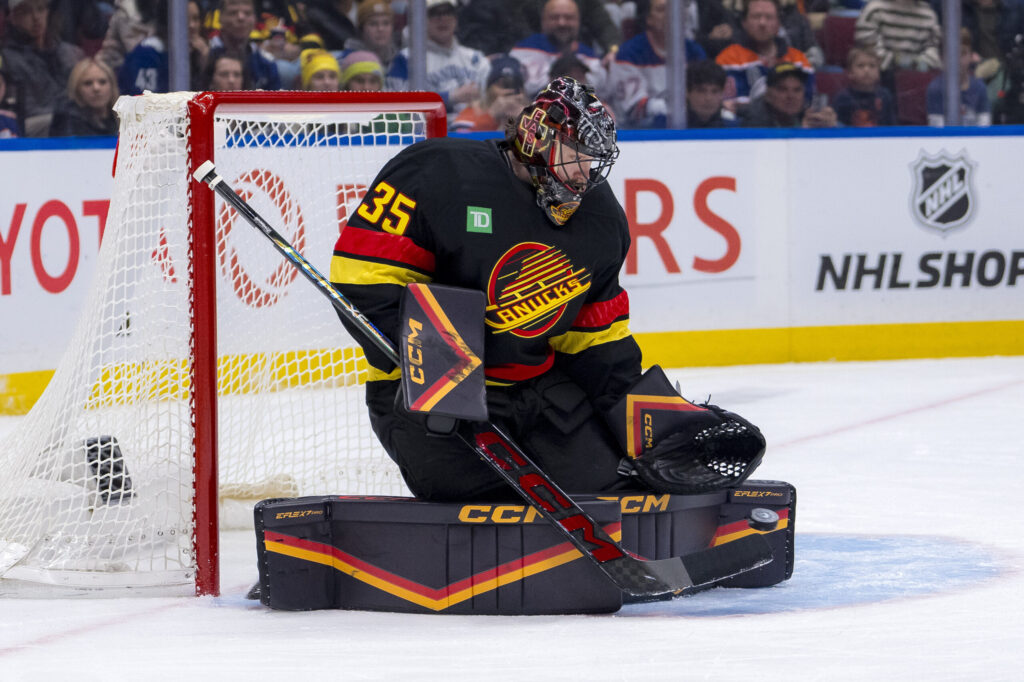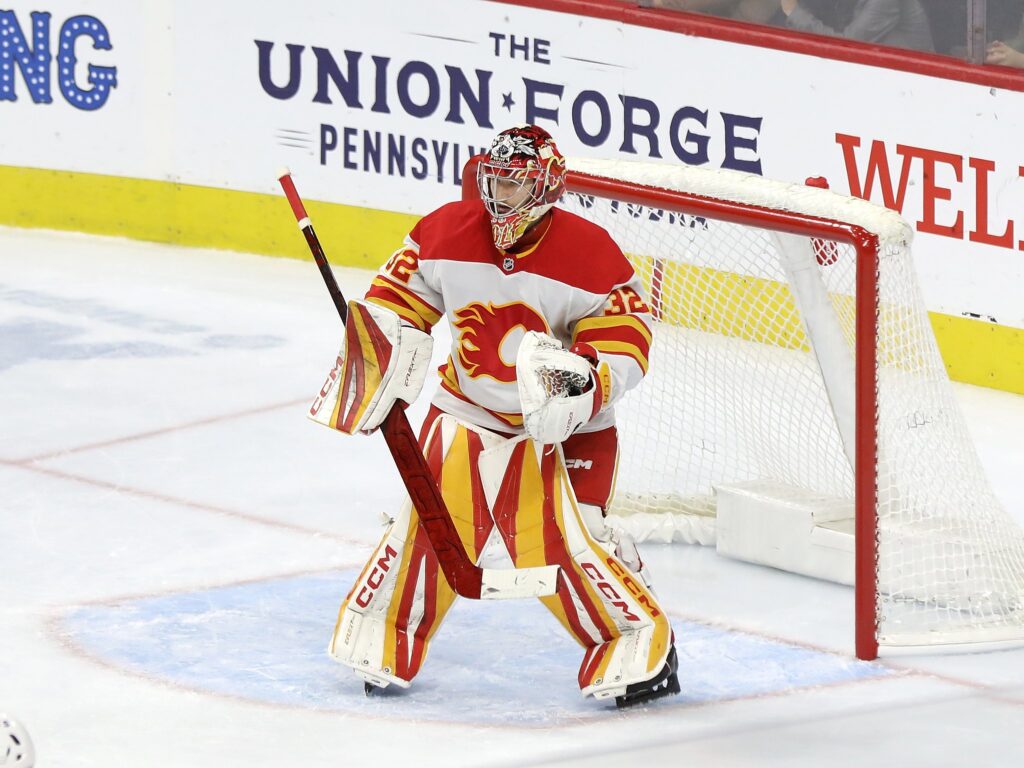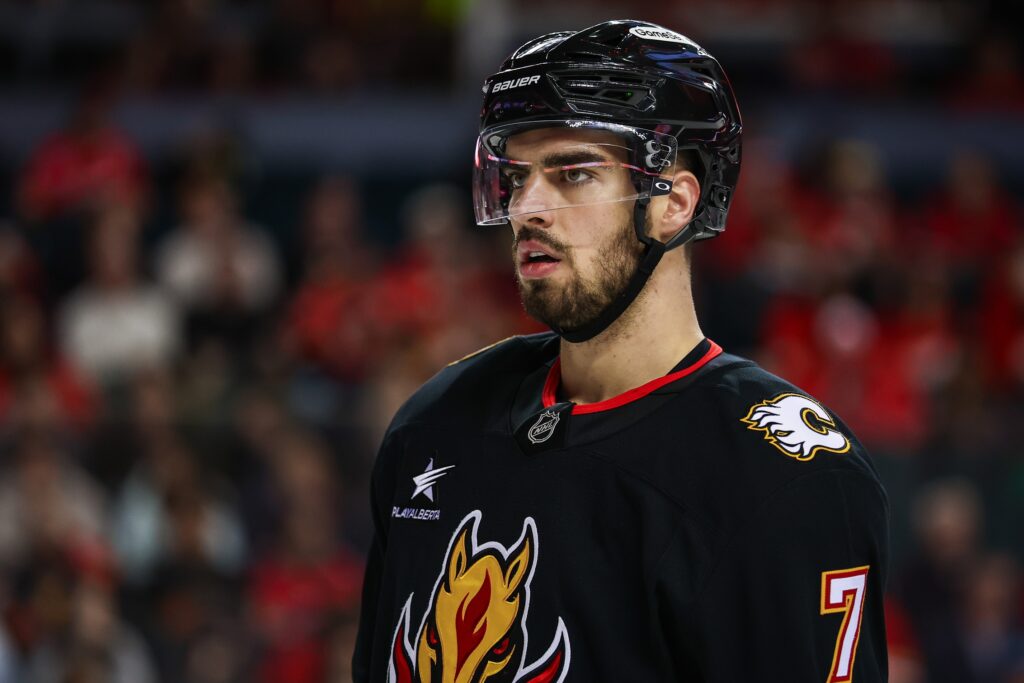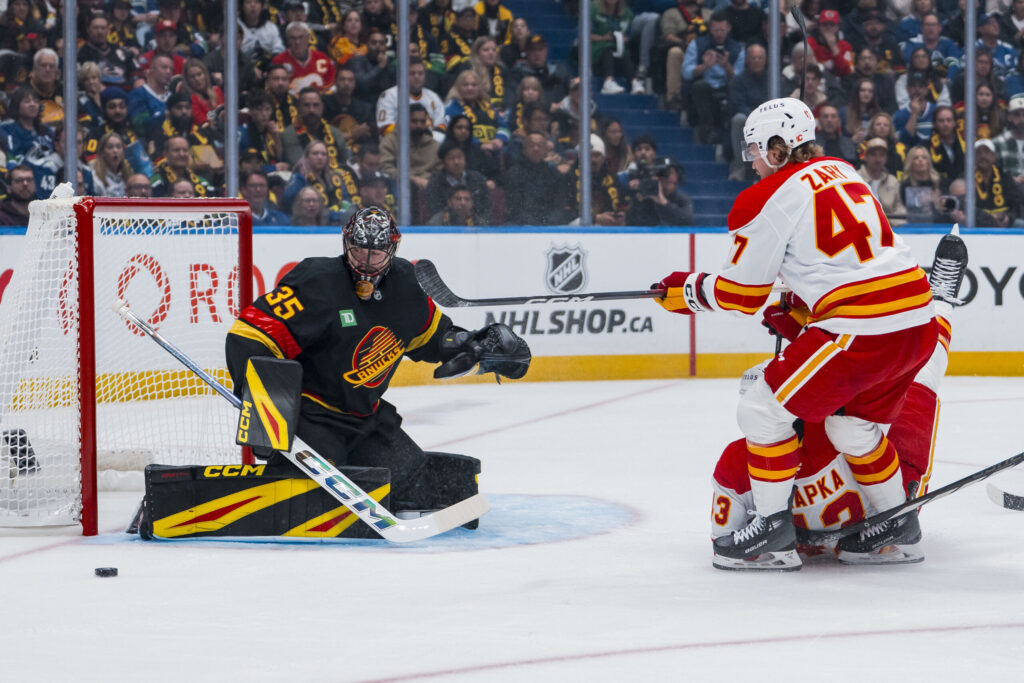It was a tale of two games wrapped into one. For 40 minutes, the Vancouver Canucks and Calgary Flames engaged in a tense, low-event chess match to open the 2025-26 NHL season. Then, the third period happened. The Canucks unleashed a four-goal deluge, turning a scoreless nail-biter into a 5-1 rout and leaving the Flames reeling from a decisive loss fueled by fatigue, questionable coaching, and familiar offensive woes.
For Vancouver, it was the perfect start. For Calgary, a team playing the second half of a back-to-back after a shootout win in Edmonton the night before, it was a harsh reminder that the new season may be haunted by old ghosts.
Also on the EDGE – Pettersson’s Redemption, Demko’s Durability, and the Vancouver Canucks’ Playoff Gamble
The Calm Before the Canucks’ Storm
Anyone who tuned out after the second intermission could be forgiven for thinking they were watching a goaltending duel destined for overtime. The first two periods were methodical, tight-checking, and largely devoid of high-danger chances. But beneath the surface, the tide was turning. While the scoresheet remained blank, Canucks netminder Thatcher Demko was quietly laying the foundation for the eventual victory.

The pivotal moment of the “game before the game” came late in the second frame. With the Canucks on their heels for a moment, Demko made a pair of crucial back-to-back saves that defined the contest. First, he denied a blast from rookie Matvei Gridin from distance. As the rebound kicked out, Demko slid with explosive power across his crease to stone Yegor Sharangovich’s one-timer from the low slot. It was a sequence of sublime goaltending that kept the game deadlocked and injected a palpable dose of confidence into the Vancouver bench. The Flames had their best chance and were denied; they would not get another one that mattered.
Vancouver Unleashes the Floodgates
The third period was a different story entirely. Less than three minutes in, the Canucks broke the deadlock in the most bizarre of fashions. A fluttering puck deflected off the back of Calgary defenceman Kevin Bahl’s head, and newcomer Filip Chytil had the presence of mind to bat it out of mid-air and past a stunned Dustin Wolf. It was a fluke, but it was the spark that lit the fuse.
Less than six minutes later, Chytil struck again, this time with pure skill. Taking a pass from Arshdeep Bains, he turned on the jets, streaked up the ice, and wired a shot past Wolf to make it 3-0. The dam had broken. Top prospect Jonathan Lekkerimäki added his name to the scoresheet and when Brock Boeser potted the fifth goal, the rout was complete. In the final 20 minutes, Vancouver fired ten shots on net and scored four times, an offensive explosion that Calgary simply had no answer for.
Morgan Frost would eventually spoil Demko’s shutout bid with a garbage-time goal that deflected off a Canuck, but it was a meaningless tally in a game that was long since decided.
The Crease Contrast
While the final score suggests a lopsided affair, the goaltending narrative is more nuanced. Demko was spectacular when he needed to be, stopping 17 of 18 shots. His performance was backed by the analytics, as he posted an impressive 1.59 goals saved above expected. He was the rock that allowed his team to find its footing before running away with the game.
At the other end, Dustin Wolf’s night was far more complicated. The 24-year-old made 21 saves, but he was hung out to dry in the third period. More concerning, however, was the fact that he was in the net at all. Forcing a young goaltender to start on consecutive nights, especially at the dawn of a new season, is a risky gambit, and it’s one that immediately brought the Flames’ management under scrutiny.

Huska’s Head-Scratchers
The decision to start Wolf was the most glaring of several questionable choices made by head coach Ryan Huska and his staff. It smacked of a lack of trust in backup Devin Cooley. The move brings to mind Vancouver’s own history of overworking a young Thatcher Demko, a strategy that ultimately led to injury. If the organization doesn’t have faith in its number two, they need to find one they do, because riding Wolf this hard is simply unsustainable.
The questions didn’t stop in the crease. Keeping Zayne Parekh, the ninth overall pick from the 2024 Draft and arguably the best prospect in the organization since Matthew Tkachuk, in the press box was another perplexing decision. To see veterans like Jake Bean and Brayden Pachal take roster spots over a player with that much upside is a move that can’t be good for the rookie’s confidence or the team’s long-term vision.
These decisions compounded an already sloppy performance. The Flames were consistently a step behind, lost the majority of their puck battles, and were thoroughly overpowered in the third. Their power play was ineffective, and the offensive struggles that plagued them last season appear to have carried over. The team’s goals through two games have been the product of what feels like an “unsustainable luck streak,” not a structured and repeatable offensive process.
Adding Injury to Insult
To cap off a miserable night, the Flames left Vancouver with injury concerns. Connor Zary took a hard check into the boards and briefly left for the room in the second but was able to return. The news was not as good for Kevin Bahl. The defenceman, who has been playing excellent hockey since signing his extension, exited the game after Chytil’s first goal deflected off his head and did not return. His absence was keenly felt as the Canucks began their third-period onslaught.

For the Canucks, this was a statement win to open their season. Their stars showed up, their goaltender was elite, and their new additions made an immediate impact. For the Flames, this was a sobering defeat. They head home with a split record, but with serious questions about lineup construction, player management, and whether they have the offensive depth to compete. It’s only game two, but the pressure is already mounting in Calgary.
Created with the aid of Gemini AI
